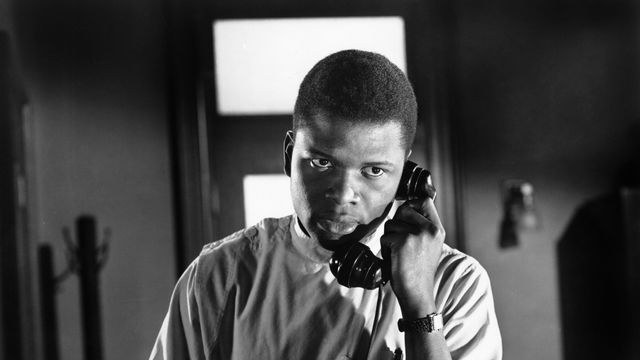
Archive Talks: No Way Out
- This is a past program
Presented by the UCLA Film & Television Archive. Learn more at cinema.ucla.edu.
In-person: Q&A with UCLA School of Theater, Film and Television Associate Professor Ellen C. Scott, author of Cinema Civil Rights (Rutgers University Press, 2015).
Daydream Therapy (1977)
With musical scoring from Nina Simone (“Pirate Jenny”) and Archie Shepp (“Things Have Got to Change”), this short film captures the fantasy life of a hotel worker whose daydreams — and quiet vengeance — provide an escape from workplace strife. An activist-turned-filmmaker, Bernard Nicolas filmed in Burton Chace Park in Marina del Rey. He wrote, directed, produced, shot and edited Daydream Therapy for his first project as an M.F.A. student at the UCLA School of Theater, Film and Television.
16mm, b&w/color, 8 min. Director/Screenwriter: Bernard Nicolas. With: Marva Anderson, Keith Taylor, Gay Abel-Bey, Larry Bell, Jeff Cox.
No Way Out (1950)
Armed only with limited stage experience (including serving as an understudy in the touring company of Anna Lucasta) and an Army Signal Corps short on his resume, Sidney Poitier answered an atypical open call for 1949: Twentieth Century-Fox was to cast numerous Black actors in key parts for a major motion picture. After several competitive auditions and screen tests, director Joseph L. Mankiewicz personally selected Poitier from a group of finalists. The actor's subsequent feature film debut in No Way Out would prove to be career-defining. His mature performance as a young doctor breaking down racial barriers under hostile circumstances embodies the combination of emotional intensity and grace that would become his hallmark in films such as A Raisin in the Sun (1961) and In the Heat of the Night (1967).
Often cited as opening the door to the social drama film genre that emerged in the 1950s, No Way Out was controversial upon release for its graphic exploration of racial violence and what Mankiewicz described as “the absolute blood and guts of Negro hating.” The film's progressive depiction of an African American community mounting a preemptive strike in the face of attack by a racist mob prompted censors in several states to delete such scenes on the grounds that they were “too provocative” and “might incite violence.” The NAACP, which protested the film's explicit use of racial epithets, condemned the deletion of the self-defense scenes, arguing that with the cuts “the film's original message [was] hopelessly lost.”
35mm, b&w, 106 min. Director: Joseph L. Mankiewicz. Screenwriters: Joseph L. Mankiewicz, Lesser Samuels, Philip Yordan. With: Sidney Poitier, Richard Widmark, Stephen McNally, Linda Darnell.
The UCLA Film & Television Archive is a division of UCLA Library, and presents its public programs in the Billy Wilder Theater at the Hammer, among other venues. For more information about the Archive, visit cinema.ucla.edu.
ATTENDING THIS PROGRAM?
Ticketing: Admission to Archive screenings at the Hammer is free. Your seat will be assigned to you when you pick up your ticket at the box office. Seats are assigned on a first come, first served basis, limit one per visitor. Box office opens one hour before the event. Questions should be directed to the Archive at programming@cinema.ucla.edu or 310-206-8013.
Member Benefit: Subject to availability, Hammer Members can choose their preferred seats and pick up tickets for one additional guest. Members receive priority ticketing until 15 minutes before the program. Learn more about membership.
Parking: Self-parking is available under the museum. Rates are $8 for the first three hours with museum validation, and $3 for each additional 20 minutes, with a $22 daily maximum. There is an $8 flat rate after 5 p.m. on weekdays, and all day on weekends.
Read our food, bag check, and photo policies.
Read our COVID-19 safety guidelines.


